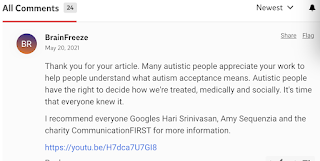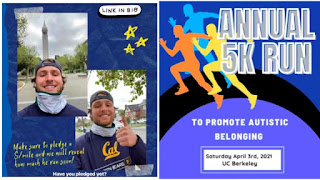Mentions
Got a mention in the comments in an article around Elon Musk.......
https://www.independent.co.uk/voices/elon-musk-autism-aspergers-b1847069.html
Raghavan Thatha online
SpectrumAtCal Spring 2021 Towards Belonging
These have to be the coolest T-Shirts
Belonging Week
#WhyIAdvocate
April 9th - Cross Cultural Panel
 Cross-Cultural Panel
Cross-Cultural Panel as a part of this Spring's Autism Acceptance & Belonging Week!
as a part of this Spring's Autism Acceptance & Belonging Week! How is autism represented in different cultures?
How is autism represented in different cultures? What are some highlights and barriers of autism advocacy in different countries?
What are some highlights and barriers of autism advocacy in different countries? What could we do to support?
What could we do to support?....

We are amazingly honored to welcome panelists who are coming from different cultural backgrounds and doing autism advocacy works at different places of the world! Even more, many of them are actually on the autism spectrum themselves, or parents of autistics.
- Igor Pereira (on the spectrum): lawyer organizing autism movement in Brazil
- Irma Aguilar-Deflin (on the spectrum): advocate from Mexico City
- Dr. Shari D Rosen (parent): founder of the first special education center in Shanghai
Event Time: April 9th (Friday), 6-7:30 Pacific Time

 Register now to hear about their experiences and international perspectives!!: tinyurl.com/cross-cultural-panel
Register now to hear about their experiences and international perspectives!!: tinyurl.com/cross-cultural-panelFireside Chats
FiresideChat#1
FiresideChat#2
FiresideChat#3 - Autism in the Media
Dont Cant Wont - Masking Camouflaging
Don't Can't Won't - Masking Camouflaging
Autistics engage in Masking
Autistics engage in Camouflaging
Attempts at passing muster, appear more "normal", make eye contact
........Effortful
........All verily exhausting
........ Very very exhausting
Contributors to Autistic Burnout.
Meltdowns and Autistic Burnout
Burnout, Burnout.
BUT, NonSpeaking Autistics
... Don't possibly Mask
... Can't possibly Camouflage
Why it is quite certain that Nonspeakers
....Won't experience Burnout.
ONLY Meltdowns, but NOT Burnout!
They don't, they can't, they won't
Déjà vu
...Don't
...Can't
...Won't
...Not Possible, No agency!!
Sorrowful words oft heard before
Ableist terminology. Disappointing!!
Reality!!
We struggle as all autistics do
Attempts at masking and camouflaging
Sometimes it works, we pass muster
Fly under the radar is often the goal.
Sprinkle on apraxia and comorbidities
the result
....variable & unreliable steering controls.
The body, a car with a loose steering wheel
unpredictable in the way it will go.
Effort required multiplied, magnified.
Autistic Burnout
Burnout Burnout Burnout
Burnout Burnout
Burnout
Related Posts
Masking & Camouflaging.
https://uniquelyhari.blogspot.com/2021/09/cm.html
Triple Bind and Masking in Autistic Females
https://uniquelyhari.blogspot.com/2021/04/triple-bind-masking.html
Masking as an evolutionary advantage
https://uniquelyhari.blogspot.com/2020/04/masking-as-evolutionary-advantage.html
CAT-Q measure to measure camouflaging in autistic females.
https://uniquelyhari.blogspot.com/2021/04/cat-q-measure-to-measure-camouflaging.html
Dont Cant Wont - Masking Camouflaging
https://uniquelyhari.blogspot.com/2021/05/dcw.html
Disability Studies Scholars
Why do Disability Studies scholars want to use such complex, almost convoluted language when the same ideas and issues could've been distilled into less complex language?
Surely less complex formal language can be equally as powerful in its informational, argumentation and persuasive capability and in getting the point across successfully; without becoming "less scholarly".
I'm taking not one but two Disability Studies classes at U C Berkeley this semester, and while I love the lectures and discussion during class delivered by the outstanding professors here, my take on some of the "scholarly" readings are quite another thing.
In a recent reading it took many many pages before to express a simple idea. It was like going through layers of camouflage to get to that idea; jargon-ny language being the camouflage.
There are actually some very good ideas and thoughts, that make us think, reflect, think of the interconnectedness of disability justice, climate justice, animal rights, marginalization, accessibility, stigma, discrimination etc.
But these all can be unearthed only after you strip off these veneers of other language which almost get in the way. You are left with a partial feeling of annoyance, impatience and exhaustion, when your mind should be fully engrossed over the thoughts presented in these readings.
The irony: Disability Studies talks the talk about accessibility and limited-spoons in the disability community. They need to walk the walk by showing and demonstrating how scholarly language itself (including their own) can/should be accessible.
irony is that many of these reading underline societal inaccessibility as a fundamental issue. Yet these very disability study readings are the very picture of inaccessibility.
This is not a critique on other disciplines, that is a whole other discussion, but specifically disability studies.
The other question is, Does it not take extra spoons to strip off all those additional veeners to get to the gist of what the author is saying, for a "limited-spoons" disability population.
For those unfamiliar with the idea of spoons or spoon theory, its the idea that all of us have only so much bandwidth/spoons in one day. Every task takes some level of time and effort. When u are disabled, your bandwidth shrinks even more as some/much of the time is taken up by disability related challenges. You have to weigh in on where your spoons are best spent so you can carry onto successfully navigating another day.
The point: Disability Studies scholars in particular need to lead by example to demonstrate what accessibility can look like in their own work.
And I'm taking not 1 but 2 disabilities studies class this sem.
As much as I love the lectures and discussion in class taught by some amazing faculty, some of the readings are quite another issue. In one recent reading it took over many many pages to explain one simple idea. All the while I was distracted, mentally jumping impatiently, almost a little annoyed, with a, What are you trying to say? & Just get to the point please."
Cal is Number 4 again
As for the top five public universities, after UC Berkeley and UCLA, the University of Michigan ranked 18th, the University of Washington 24th and UC San Diego at 27th.
Three other UC campuses made the top 50: UC Davis placed 34th, UC Santa Barbara 43rd and UC Irvine 45th.These latest rankings by the U.K.-based rankings firm evaluated 350 research universities in 49 states.
New York state had 74 universities in the rankings. California was the next best performing with 38.
QS (Quacquarelli Symonds) specializes in the analysis of higher education institutions."
Multiple Intelligences and Autism
Autism Lexicon: Multiple Intelligences
Multiple intelligences in autism refer to the diverse cognitive strengths and abilities exhibited by autistic individuals, which may not align with traditional measures of intelligence but encompass distinct domains such as linguistic, logical-mathematical, musical, spatial, and interpersonal skills.
PlainSpeak. Multiple intelligences in autism highlight that autistic people have unique strengths and talents in different areas, like music, math, or understanding nature, which aren't always recognized by standard measures of intelligence.
Read more about Multiple Intelligences
Agency
Agency
Who got to decide? Who is first in Line?
Who has agency, sovereignty?
Is it human entities?
Is it all humans, or just some humans entitled to treaties?
Who got to decide? Who is first in line?
Who has agency?
Is it nonhuman entities?
Is it all nonhuman entities, or just when it suits our needs?
Who got to decide? Who is first in line?
Why the disconnect?
Earth sentient or not, is deeply intertwined.
Species and land, inextricably linked are we.
Temporal, spatial, transcend the literal sense.
Treaties don’t belong to just humankind.
Symbiotic agency abound all around.
Nature weeps - we term it climate change.
A delta change that multiplies every day.
Weep, bemoan and cry.
Live with us, not over us. Listen to us.
“Nothing about us without us,” a déjà vu plea.
Harmony, concur side by side.
Humans are but another carbon-based entity.
Understanding Multiple Intelligences and Autism
The theory of multiple intelligences, developed by psychologist Howard Gardner, suggests that people have different types of intelligence or abilities, rather than a single, unified form of intelligence. This theory helps us appreciate that everyone has unique strengths in various areas. It’s particularly useful for understanding autism, as it highlights the diverse talents that autistic individuals often have, even if they don't fit the traditional definition of intelligence.
Here’s a simple explanation of the different types of intelligence and how they relate to autism:
Linguistic Intelligence: Some autistic people are great with words, excelling in writing, storytelling, or learning new languages. They might be especially good at written communication, where they can express themselves without the pressures of social interaction.
Logical-Mathematical Intelligence: Many autistic individuals are brilliant with numbers, patterns, and logical thinking. They often excel in areas like math, science, and technology, using their attention to detail and systematic thinking.
Musical Intelligence: Autistic individuals may have a strong connection to music, showing talent in playing instruments, singing, or composing music. They might have perfect pitch or a deep appreciation for musical patterns, which aligns with how they process sensory information.
Bodily-Kinesthetic Intelligence: Some autistic people are skilled at physical activities, like dancing, sports, or crafting. This intelligence involves using their bodies to express themselves or manage their sensory experiences.
Spatial Intelligence: Visual thinking is a strength for many autistic individuals, making them good at understanding spaces and visualizing things. This can be helpful in fields like art, design, and architecture, where seeing how things fit together is important.
Interpersonal Intelligence: While social interactions can be challenging, some autistic people are good at understanding others' feelings and thoughts, especially in structured environments. This intelligence helps in careers like counseling, where understanding people is key.
Intrapersonal Intelligence: Autistic individuals often have deep self-awareness, understanding their own emotions, thoughts, and motivations well. This intelligence helps them in personal growth and self-advocacy, allowing them to understand and manage their own needs.
Naturalistic Intelligence: Some autistic people have a strong interest in nature and are good at observing and understanding plants, animals, and the environment. They may excel in areas like biology, environmental science, or conservation.
Existential Intelligence: Many autistic individuals think deeply about life’s big questions, such as the meaning of life, death, and existence. This type of intelligence can lead to profound insights and contributions in philosophical or spiritual areas.
Recognizing these various intelligences allows us to better understand and support the unique talents and needs of autistic individuals. It helps us move beyond traditional ideas of intelligence and appreciate the valuable contributions everyone can make to society
2 versions of this post
Phi Beta Kappa
Just now figured out why there was a fourth greek alphabet - UC Berkeley's is the first (alpha) chapter in California. Initial initiates were literally tested for their proficiency in Greek and Latin. LOL
PBK is as old as the US, founded in 1776 for literary pursuit and philosophical debate. Only 10% of US colleges have PBK chapters and only 10% of those get "elected" into PBK. Apparently you are "elected," into the society, not selected.
Coolest of all - Started as a "secret society" - with secret symbols, secret hand gestures & all - How about that!
Caveat - only males initially in this secret society (all these secret societies seem to be very male oriented)
Good news - UC Berkeley chapter started in 1898, by which time students of all sexes allowed. No longer secret, I guess!!
I got an invitation to join the UC Berkeley Chapter of Phi Beta Kappa, a very prestigious academic honor society pbk.org & pbk.berkeley.edu
As the email invite said on Mar 5 state:







































